
- Home
- India
- World
- Premium
- THE FEDERAL SPECIAL
- Analysis
- States
- Perspective
- Videos
- Sports
- Education
- Entertainment
- Elections
- Features
- Health
- Business
- Series
- In memoriam: Sheikh Mujibur Rahman
- Bishnoi's Men
- NEET TANGLE
- Economy Series
- Earth Day
- Kashmir’s Frozen Turbulence
- India@75
- The legend of Ramjanmabhoomi
- Liberalisation@30
- How to tame a dragon
- Celebrating biodiversity
- Farm Matters
- 50 days of solitude
- Bringing Migrants Home
- Budget 2020
- Jharkhand Votes
- The Federal Investigates
- The Federal Impact
- Vanishing Sand
- Gandhi @ 150
- Andhra Today
- Field report
- Operation Gulmarg
- Pandemic @1 Mn in India
- The Federal Year-End
- The Zero Year
- Science
- Brand studio
- Newsletter
- Elections 2024
- Events
- Home
- IndiaIndia
- World
- Analysis
- StatesStates
- PerspectivePerspective
- VideosVideos
- Sports
- Education
- Entertainment
- ElectionsElections
- Features
- Health
- BusinessBusiness
- Premium
- Loading...
Premium - Events
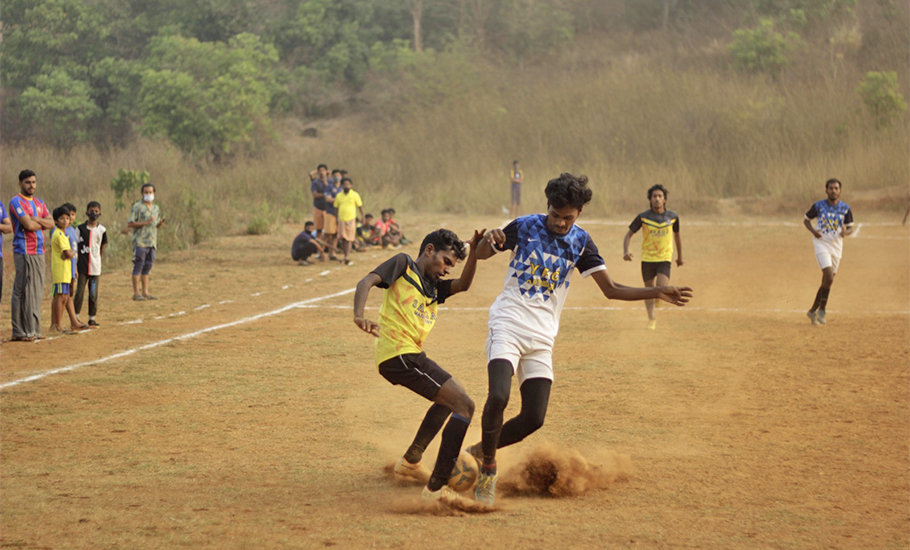
How a group of youngsters in Kerala is kicking in a Sevens football league circuit

It was during the first phase of Covid-induced lockdown that Deepak AG, a journalist-turned-social-science researcher, started playing football early morning at Velliyad near Vaniyamkulam in Palakkad district of Kerala, along with a few friends. Vaniyamkulam, located in north eastern Kerala and famous for its busy cattle market, has no legacy of any big sports or sporting culture. The...
It was during the first phase of Covid-induced lockdown that Deepak AG, a journalist-turned-social-science researcher, started playing football early morning at Velliyad near Vaniyamkulam in Palakkad district of Kerala, along with a few friends. Vaniyamkulam, located in north eastern Kerala and famous for its busy cattle market, has no legacy of any big sports or sporting culture.
The strict restrictions on large gatherings made it difficult for the youngsters — majority of them working from home due to the lockdown — to find a place to play. And so they felt early morning hours could help to dribble and kick the ball around as a form of both exercise and entertainment.
“Despite the hardships posed by the lockdown and the pandemic, this was an exciting period in a way because of football,” Deepak tells The Federal.
“We thought of having regular playgrounds and football sessions even after the lockdown was lifted. That’s how the idea of launching a rural football league came up and we started the Vaniyamkulam Football League after the first phase of lockdown in 2020. We had a detailed plan of 132 matches altogether, but had to cut short the league’s schedule after 80-85 matches owing to the second wave of COVID -19 in 2021,” he says.
With regular life being spent between office and home, Deepak and his friends had found little time to play. When the pandemic arrived, they realised the need for proper playgrounds and dedicated tournaments to promote the game.
Deepak’s idea of having a rural football league was not received well initially, but after a couple of months of brainstorming with friends, others came around too. Sreejith N, Ranjith, Prasanth, Rahul, Vysakh and his mate Sumisha shared his enthusiasm to play the sport. Deepak’s brother Prajeesh, a meteorologist by profession, came up with a mobile application to register and manage teams and players for the league. Now, this group of friends is planning to expand their project by introducing a well-knit statewide football league for the seven-a-side football named Football New Wave. During the course some of the initial organisers left, and some others like Arjun, Satheesh, Rafeek , Sameer, Rahees Ali, Fasil and Irshad joined in.
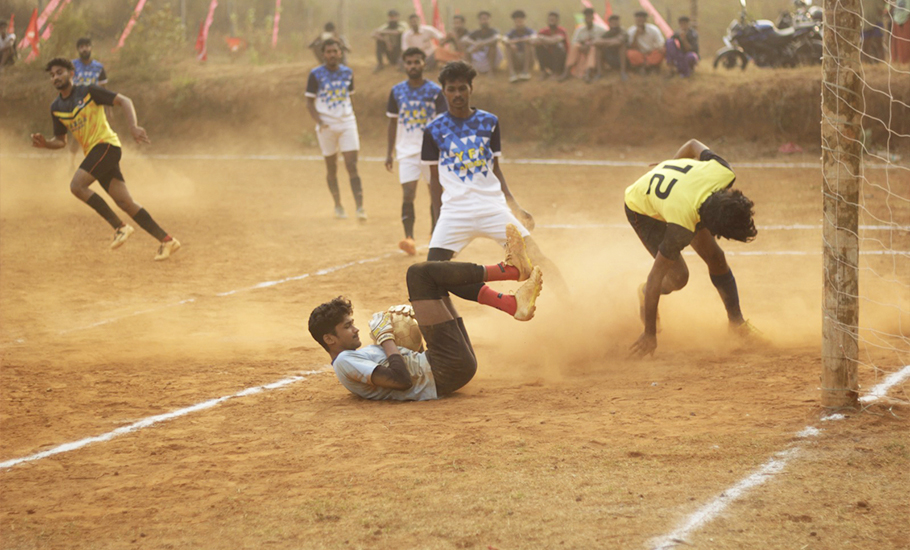
“Football New Wave (FNW) is a project dedicated to transforming the football landscape in Kerala. We aim to introduce European-style, district-wise domestic, and statewide champions leagues. We focus on infrastructure development, building a local fan base, ensuring sustainable club income, and delivering quality football entertainment for fans,” says Deepak AG, co-founder of the project.
“We have already spoken to a number of ‘football activists’ across the state, and this year we are starting with the district domestic league in Ernakulam. We have already launched a website and a mobile application for this and we are quite confident that we can pull off this momentous tournament,” claims Deepak.
On the ground, there is support for Deepak and his team’s idea.
“Their concept appears to be good and has the potential to bring back the evening games of football that were once common in our rural communities but have now been forgotten,” says Mustafa, a resident of Perumbavoor who manages Base Sevens football club.
“In the Ernakulam district, there used to be close to 140 annual competitions, but now there are just 10 or 12 of them. In addition to the 70 or so teams playing local matches, we now have only one club that competes in all-India events and 24 teams that compete in tournaments held in each state. This proposed league could prove very useful for us to develop not only football but local sporting infrastructure as well,” says Mustafa.
According to him, the league could be more beneficial for the southern districts as the northern region have no dearth of football matches.
The history of Sevens
The origins of football in Kerala can be traced to the British era and the Malabar region, particularly the Malappuram district. It was the Britishers of the Malappuram Special Police (MSP), a paramilitary force (now Malabar Special Police) formed in 1897 to quell ‘native disturbances, who introduced the game to the locals. The British policemen used to play football and gradually the locals got attracted to the game. However, when it started, the natives weren’t allowed to play, and their role was limited to fetching the ball from outside the touch line while the police personnel enjoyed their good on the ground.
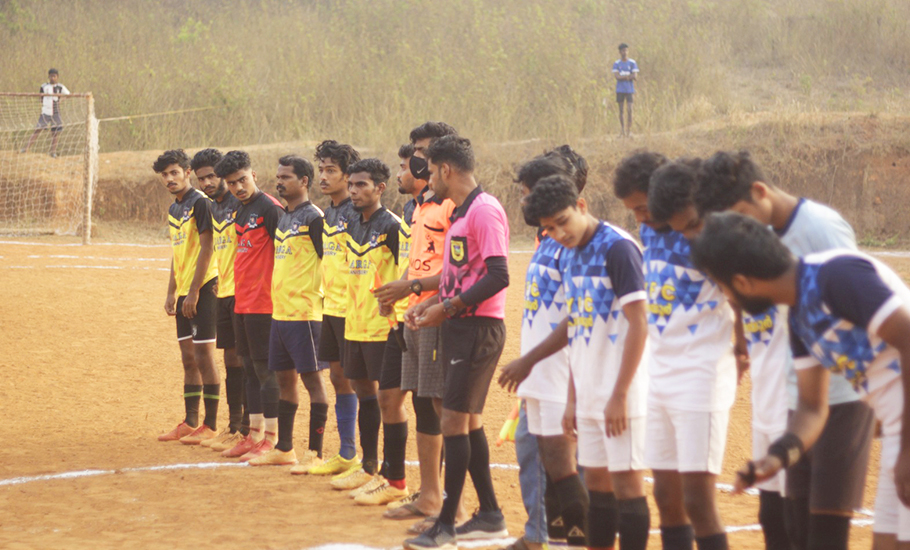
After the infamous 1921 riots, which was painted communal for obvious reasons, the police force lost the trust of the native population. The then commandant of the MSP used football to win back the faith of the local Moplahs by introducing the game to them and allowing the locals to participate in matches and there started Malappuram’s mohabbat with this beautiful game.
Football enjoys popularity like no other event in Kerala, particularly the northern districts of Malappuram, Kozhikode and Kannur. Over a period of time, the game has become almost synonymous with the region and its people, who are largely responsible for its vast popularity in Kerala. The whole of Malabar region are under the grip of a cacophonic fever during major football events across the globe, be it the FIFA World cup, Euro Cup, Copa America or even the European Club championships.
Sevens football
Sevens football is a shorter version of the game that originated in Malappuram. The sport is played on almost the same pattern as regular football but the rules are slightly different and so are the playing time and ground. Each team has seven players against the regular 11. The match is played for an hour as opposed to the usual 1.5-hour normal football match. The ground is comparatively smaller. Red cards are rarely taken out by the referee and offside rules are mostly overlooked.
Most people have the knowledge of this shorter version of football as the game originated here only a few knows exactly where and when but everyone is sure that it has contributed vastly to the Kerala football.
A number of regular Sevens tournaments take place in the northern part of the state. But the same is not true of the southern region. Nearly 50 per cent of the sevens football tournaments being held across Kerala are organized in Malappuram district alone. Mampad, Perinthalmanna, Morayur, Areekode, Kottakkal, and Tirurangadi host major tournaments of varying levels every year.
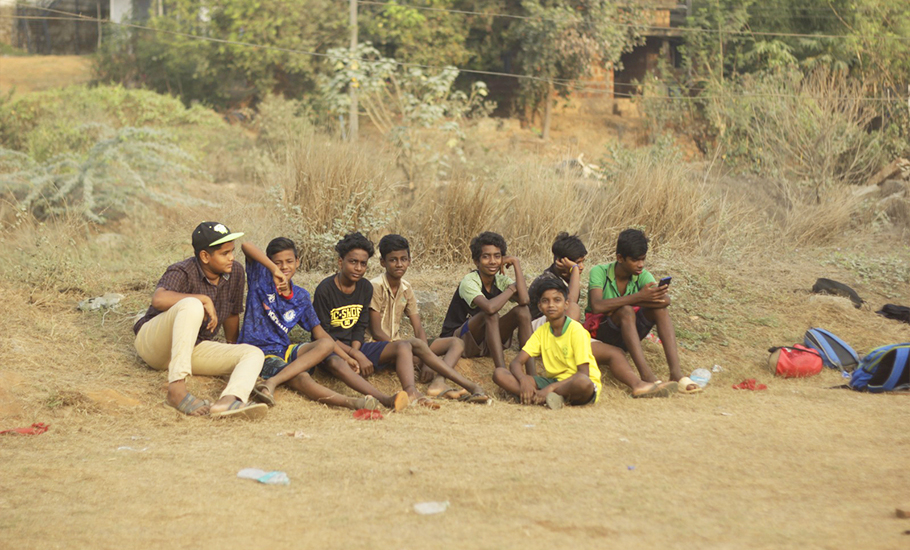
The more modest tournaments are organised in open paddy fields without any arrangement for stands. There are usually no tickets for these tournaments. The teams which participate in such tournaments are usually from nearby villages. In most cases, there will be some hired players, including African nationals who come to Kerala with the football season in mind. They are called Sudani or Nigerian, or just karumban (black). As these tournaments do not have a governing or commanding body, there are no strict rules for hiring. The hiring fee of the players is also quite modest. It could be as low as about Rs 200 and an after-game meal. With no tickets for spectators, these tournaments are made possible through sponsorship from local business establishments in return for advertisements through the PA system or banners and hoardings.
“Vaniyamkulam Group is trying to decentralise and democratise the process of organising sevens football games by giving it a definite structure. We wish to conduct the league with huge participation of people from every walk of life. So, crowd funding is being envisioned as our main source of income. We have already registered a private limited company with ten shareholders, which we want to expand to 200,” says Deepak.
“This is a brilliant idea,” say Dilshad Ibrahim and Krishna Kumar, who work in a Jeddah-based petroleum company, over video call. Both of them were former college level players during their student days. “During our times, we did not get such opportunities to play football. Match practice is important for any player to stay in touch and sustain the form,” says Dilshad.
“A chain of rural leagues is a very impressive idea and it could lay the foundation of the future of Kerala football, if they can find proper funding and other resources,” Krishna Kumar adds.
“We can see a number of football leagues in Europe. In fact, these leagues are the backbone of their footballing culture. A league can offer the teams an assured number of matches annually, which is important for players to have match practice,” says Sijin BT, a noted Sports Management Guru and founder of Sports and management research institute, Kochi.
“For example, when we take our professional football scene, our players only get 20-odd matches a year, whereas in Europe, players like Messi or Ronaldo play at least 50-55 matches. So, a system of league matches, be it Sevens or any format, could give the players the match experience they need as professionals,” Sijin adds.
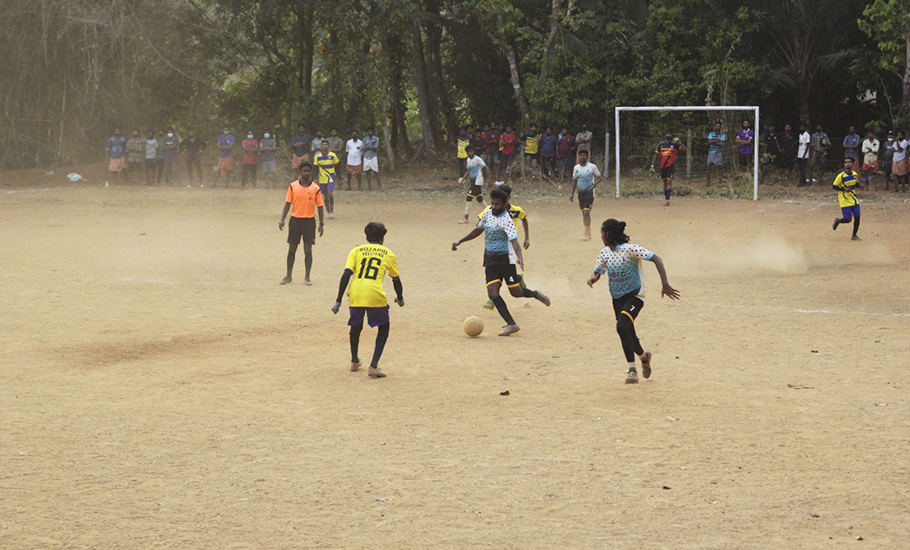
“Football still exists in Kerala because of sevens football. It was this version that kept the game together when numerous PSUs and departments like Travancore Titanium and Kerala Police disbanded their football teams. At least till the ISL came to the fore. Sevens, for us, is like what Futsal is for south America. It could become a major sporting event in the near future. As a business model this sounds better compared to local tournaments. It will provide extended visibility to the sponsors too, within the stipulated schedule and venues. This could well be a stepping stone for a hitherto unexplored rural sports economy,” adds Sijin.
“Sevens football is the toughest version of football played in the country. It’s very physical and most of the time rules are not implemented by the referees. Guys like me had benefited from this in terms of endurance level and fighting spirit,” Indian international player CK Vineeth tells The Federal.
“But the game has no recognition from the authorities. The quality of refereeing and adherence to the rules are on the poorer side. This is one area where these guys should focus. As an initiative from the grassroots, it sounds promising but on the other hand, I am not particularly confident about the future of Sevens as far as the contribution it could offer to the quality of the game,” he adds.
“Obviously, Sevens has huge fan following, but it should be organised in a better manner,” says Vineeth who has played for Kerala Blasters, Bengaluru FC, Jamshedpur, Channayin FC and East Bengal in the ISL apart from his stints in various teams in the I-League.
The concerns notwithstanding, Sevens has many positives that raise hope for its future in Kerala. Even FIFA acknowledged sevens football in 2022 by showcasing a documentary, Maithanam, based on it.
The new venture by a group of friends from Palakkad could well dominate the roost capitalizing on all the football craze still present in the southern Indian state following Messi and company’s victory at the 2022 World Cup.
